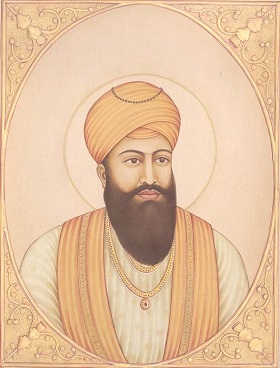Arjun Dev’s mother was Bibi Bhani, the youngest daughter of Guru Amar Das. Bhani’s husband, Jetha, was devoted to her father. The couple chose to live with the guru and so Arjun Dev was raised in his grandfather’s household. Amar Das appointed Jetha as the fourth guru and named him Raam Das. Arjun Dev had two older brothers, Prithi Chand and Maha Dev. The eldest aspired through trickery to become the next guru. However devotion and steadfast service earned Arjun Dev the succession and title of fifth guru. Arjun Dev married Ganga, the daughter of Krishan Chand, and produced one son, Har Govind, who would succeed him as sixth guru.
Architect:
Arjun Dev worked beside his father, Guru Raam Das, who founded the spiritual compound, “Harmandir Sahib,” or “Temple of God,” and began excavation of the the manmade lake, “Amritsar,” which means “immortal waters.” After the death of Guru Raam Das, Guru Arjun Dev carried on the task begun by his predecessors to complete construction of what is today commonly known as the Golden Temple and the moat like sarovar of sacred waters surrounding it.
Poet:
Guru Arjun Dev wrote poetic scripture praising the divine, and extolling the virtues that the Sikh gurus exemplified. He penned 7,500 lines of poetic inspirational verse in all. He compiled the sacred songs and poems of earlier Sikh gurus, Hindu bhagats and Muslim pirs, and bound them together with his own inspirational compositions to create the texts of the Adi Granth. He installed the holy scripture in Harmandir Sahib. The Adi Granth makes up the major portion of Sikhism’s eternal holy scripture, the Guru Granth Sahib.
Other Contributions to Sikhsim:
Guru Arjun Dev continued the tradition oflangar, the guru’s free kitchen, where worshipers sat side by side to eat regardless of caste or rank. He established a system for gathering and collecting dasvand, a tenth part of earnings, or tithe, to be donated as goods, community service, or cash. He sent representatives known as masands around the country to preach, teach, and collect offerings to be used locally in the free kitchen.
Martyrdom:
When ordered by Mughal rulers to change a passage of scripture referencing Islam, Guru Arjun Dev refused and became the first Sikh martyr. Enduring five days of unrelenting torture, he achieved martyrdom at the hands of 17th century fundamentalist Muslim rulers who sought to put an end to the spread of Sikhism. Guru Arjun Dev’s martyrdom set an inspiring example of selflessness and steadfast courage in the face of overwhelming oppression.
Important Dates and Corresponding Events:
Dates correspond to the Nanakshahi calendar.
- Birth: Goindwal – May 2, 1563. Arjun Dev (Arjan Dev) is born to mother, Bibi Bhani and father, Guru Raam Das Sodhi.
- Marriage: 1589. Arjun Dev first weds Ram (Dai) Devi, daughter of Bhai Chandan Dass Suri of village Maurh. Because of jealousies resulting in treachery, she expires without issue. Guru Arjun Dev later weds Ganga, daughter of Krishan Chand of Meo near Phillaur of Jalandhar. Mata Ganga also has difficulty with miscarriages. With the blessing of Baba Buddha the couple at last produce one son, Har Govind (July 5, 1595 – March 19, 1644) Attempts are made on the infants life, but he survives.
- Inauguration as Guru: Goindwal – September 16, 1581, Passing over his elder sons, Guru Raam Das appoints his youngest son, Arjun Dev, his successor.
- Completes Amritsar: 1604, Guru Arjun Dev completes construction of the sarovar and the building of Harmandir Sahib, known as the Golden Temple in present day Amritsar, India.
- Death: Lahore of modern day Pakistan – June 16, 1606. Guru Arjun Dev is martyred at the hand of the Mughals and names his son, Har Govind, to be his successor.

